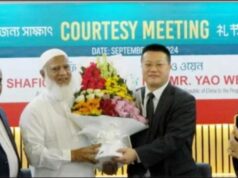China’s insidious role in Myanmar is increasingly under the spotlight. Even as the country reels under floods with more than 23,000 people reported displaced from 13 towns in the southern part of the country, it cynically fuels the civil war now three years old following the 2021 military coup.
Important to note is the role China is playing both in terms of its links with the ruling junta and the rebel groups.
China’s Insidious Role
China is a major supplier of arms to the military junta, thereby enabling the prolongation of the war. China private and state-controlled firms operating from the mainland and Hong Kong, have emerged as the main suppliers of weapons and equipment including drones, fighter jets, tank upgrades and so on.
The UN estimates that since the coup, the junta has imported military hardware worth at least $1 billion ($267 million from China, $406 million from Russia). These include, apart from platforms, raw materials for making weapons.
For the Ethnic Armed Organizations (EAO) fighting the junta, the Chinese grey market has been a major source of weapons with prices seeing a five-fold rise owing to the heavy demands placed by the civil war.
The supply of weapons to all players in the war reflects Beijing’s interest in a neighbour where, as of last year, it has invested over $21 billion (which is about 23% of Myanmar’s total FDI). After Singapore, China is the second largest investor in Myanmar with major interests in hydropower, oil and gas exploration and other natural resources.
China’s Economic Activities
China has laid a network of oil and gas pipelines stretching for 2,380-km from Myanmar’s Rakhine state to Yunnan province. It has also received the rights for related development projects including the $2.5 billion Mee Lin Gyaing LNG project in the Ayeyarwady region.
Revival of work on the Chinese aided Myitsone hydropower project in northern Myanmar’s Kachin has been reported. This is despite fighting between Kachin rebels and the Myanmar army. The Myitsone project comprises seven dams at the confluence of two rivers to generate 20,000-MW of power when completed.
It has been mired in environmental controversies with a major study in 2009, by Myanmar and Chinese scientists, warning against it.
China is particularly interested in the reported rare earth minerals in the Kachin and adjoining Shan state. It is estimated that $1.4 billion worth of such minerals was exported to China last year although this figure maybe on the low side given rampant smuggling.
The civil war may have, for now, stalled Beijing’s interest in the economic corridor that will link Yunnan with Myanmar’s west coast, giving China access to the Indian Ocean. In the process, it is also expected to help Beijing reduce its dependence on the Straits of Malacca and the South China Sea. With that goal in mind, Beijing is investing $1.3 billion in the Kyaukphyu Deep Sea Port.
There are plans for Core Zones in border areas where hotels, manufacturing and financial service companies can invest and set up shop. Again, the civil war is a huge dampner.
Debt Trap Concerns
The point to understand is that the undeveloped state of Myanmar’s infrastructure means that China’s investment impact is limited. There have been delays, implementation challenges due to concerns over the environment, debt risks and lack of transparency.
Typically, Chinese loans have higher interest rates than those offered by the World Bank or the IMF, and Myanmar’s Auditor General has warned that Beijing could gain control of key strategic projects. Myanmar currently owes China 28% of its GDP and 40% of its total foreign debt.
China backed projects are in the cross-hairs of resistance groups with 8000 clashes recorded since the coup in 2011. Locals fear such projects will endanger their livelihoods, not to mention poor or no compensation. Local industry is being outbid by Chinese firms with no benefit to local communities.
Thirty eight years in journalism, widely travelled, history buff with a preference for Old Monk Rum. Current interest/focus spans China, Technology and Trade. Recent reads: Steven Colls Directorate S and Alexander Frater's Chasing the Monsoon. Netflix/Prime video junkie. Loves animal videos on Facebook. Reluctant tweeter.





